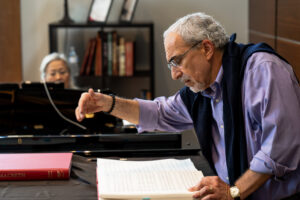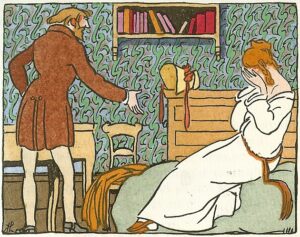Each month between now and the beginning of the 2023 season, I want to give you a window into what excites me about the pieces, productions, and artists coming to The Glimmerglass Festival this season. It is full of some of my favorite works, each one containing some of theater’s most goosebump-inducing moments. This month let’s take a closer look at our colorful, traditional, spectacular revival of Giacomo Puccini’s La bohème. And if you have time on your hands, jump to my playlist and enjoy some of the special moments that give us all “the feels” in this iconic piece.
Haze of Nostalgia

These past two weekends I have played for the morning services at Christ Church, Cooperstown. The church was lovingly renovated in 1840 by the churchwarden at the time, James Fenimore Cooper himself. The famous author’s grave can still be seen in the Cooper family plot next to the church. Although the winter services are held in the pretty side chapel, the main church will provide the setting for one of the Festival’s Thursday lunchtime concerts this summer. These concerts will be held in some of Otsego County’s most beautiful locations and are offered free to the public (made possible by the generous sponsorship of Oxalis) as a small way for us to say thank you for the support we receive from our community (stay tuned for more details about this series soon).

As my rusty feet struggled through my Bach fugue as I practiced, having not so much as thought about the organ for nearly two decades, I was nevertheless amazed that every nuance of the mini masterpiece was still seared into my emotions. The syncopated theme, the whirling counterpoint, the dramatic build-up to that “gigantic” final pedal entrance (so deliciously overstated in Leopold Stokowski’s rapturously romantic arrangement) – they continue to inspire feelings in me that go far beyond the pretty patterns made by the dots on the page. I still remember exactly what it felt like to discover these wonders for the first time, and I respond just as viscerally today; if anything, the haze of nostalgia has only made my reactions stronger.
music about real life

The first complete opera I studied, prophetically under the aegis of GGF’s current Music Director Joseph Colaneri, was La bohème. This wasn’t music that evoked galaxies and universes like that Bach fugue – this was music that was about me, about us, about real life, love, loss, and all the infinitely varied and complex emotions we get to share. Not only that, but the sounds I was hearing were more beautiful than any I had ever imagined and most of them were being made just by the human voice.
There are so many sublime moments in La bohème – strokes of musical and dramatic genius that retain all their beauty and power no matter how many times you hear them, just like that Bach fugue has stayed with me over the years. And most excitingly, there will be artists and audience members at the Festival for whom this is their moment of discovery, while others will be returning because they need their Bohème fix. Whichever category you fall into, this masterpiece is fresh as a daisy.
A moment I’ve never forgotten comes near the end of the opera. Mimì is trying to put a brave face on things by telling her friends she feels better now that they’re all there by her side, but they all know she is near the end. Everyone is doing their best to smile through their tears, but they realize right at this moment that their innocence is lost forever, and nothing will ever be the same again. That final aside from Colline, “Ah, miseria!” (“Ah, poverty!”) breaks me every time. If you’re looking for a great version to listen to, this whole recording is a miracle, made on a whim because the conductor had some spare time on his hands hanging out in New York and there happened to be some great singers in town at the time. The final twenty minutes are almost unbearably beautiful.

Puccini threw everything he had at this slice of life – Italian melodies, German harmonies, French orchestrations, his own unerring, even uncanny sense of pacing and drama. Yet instead of writing about kings and queens and gods and implausible melodramatic situations, he chose to write about ordinary people. That single herring the four Bohemians call dinner in Act IV? Puccini based that on an actual incident from his student days. Colline pawning his coat to keep Mimì’s hands warm? Puccini often had to pawn his possessions to make ends meet as a struggling young artist. Even the Henry Murger novel Scènes de la vie de bohème which inspired the opera was itself semi-autobiographical. Never before had opera felt so real.
Bohemians you want to hang out with
Not much has changed. It’s still tough being a young artist today, which is why this story is still so relatable. Our vibrant cast all found their way to this point in their careers through their incredible passion, talent, and hard work, and they know as well as anyone what makes these characters tick. Not only that, but they’re all beautiful souls to boot – so giving, honest, and eager to share the music they love. It’s a group of Bohemians I’d want to hang out with – if you book your tickets soon, you might even get the chance this summer!
Teresa Perrotta – Mimì
Our Mimì, soprano Teresa Perrotta, saved Glimmerglass’s bacon back in 2019 by stepping into the leading role of Marie Antoinette in The Ghosts of Versailles at the last moment when our production was on tour in France. She performed the same trick last month down in Washington D.C. with a flawless turn as Alice Ford in Falstaff for Maryland Lyric Opera on just a few hours’ notice. This time, she has plenty of time to prepare – she’ll even perform Musetta with Washington National Opera just before she comes to us! Let’s hope she remembers whose lines to sing…
Joshua Blue – Rodolfo
Tenor Joshua Blue has an equally confusing task ahead. Before taking on our Rodolfo, he plays the role for Opera Philadelphia, but backwards (their production plays the four acts in reverse order). He’s a magnificent artist and watching his voice grow into these major roles has been truly humbling – this is a Glimmerglass debut to watch! Here’s a sneak preview of what’s in store for you this summer:
Darren Drone – Marcello
Our Marcello, baritone Darren Drone, makes his company and role debut with us this summer. He’s very busy right now singing the title role in Falstaff out at Opera San José and got to talk about the experience on live TV recently. His generous spirit is infectious (despite being put right on the spot by the interviewer!)
Talent on the Rise
Along with the great buffo bass Stefano de Peppo, last season’s star of Tenor Overboard, they’re joined by young artists Emilie Kealani, Justin Burgess, and Nan Wang, all incredible talents on the rise. It’ll be Bohemian heaven!
|
|
|
A night out made real
There’s one more crucial character in this piece – the colorful chorus that makes the night out at Café Momus feel so real. Just look how vibrant this scene is in our production:
|
|
|
Puccini uses a coro di ragazzi as part of this scene, sung by our amazing children’s chorus. In Italian opera, the coro di ragazzi is used almost like a trumpet within the choral texture – they have a special sound designed to cut through the orchestra. To help get that special sound, I’m going to train them myself this season – I can’t wait to get started! Our children’s chorus is an incredibly special opportunity for your kids to learn what it’s like to be on stage working alongside experienced professionals and we guarantee a summer they’ll never forget. You can even audition to be on stage with them, as we have some spots open for local choristers to join in the fun as well. Auditions for both our local chorus and children’s chorus are coming up very soon – sign up for your spot today!
And before I forget, do you have your tickets for the best party of the season yet?!? Our Gala celebration on April 4 is a star-studded feast of cocktails, dinner, dancing, and stellar performances in one of NYC’s most spectacular venues. This is the splashy night out you need – get your ticket today to prevent serious future FOMO.
Some works of art touch the eternal and the universal in all of us. La bohème is one of them. It makes the ordinary divine, our struggles sublime, the humble sacred. Bohème is, well, EVERYTHING. It’s everything opera can be. Is it sentimental and even borderline emotionally manipulative? Of course it is – but it’s so GOOD at it! And isn’t that why we come to the theater?
Rob’s Playlist
|
A young guy summoning up the courage to ask out a pretty girl (it was high Cs like this that made Pavarotti untouchable). |
He seems cute, this guy! So cute, she drops her guard and starts to let him into her world (happy 96th birthday, Leontyne Price!) |
|
The first date is on – what a rush! (Toscanini conducted the world premiere of this opera, so I guess he’s allowed to sing along…) |
The date turns into an unforgettable night out with friends (yes, this Zeffirelli production is great, but our Café Momus scene is even better!) |
|
There’s real musical genius here too – not just perfectly crafted melodies and sumptuous orchestrations. One thing opera can do that straight theater can’t is allow several people to talk at the same time and still have it make total sense. Rather than try to explain myself, I’ll let Maestro Bernstein. |
So here’s the great quartet at the end of Act III. Two couples are talking: one deciding that even though they’re terrible for each other, they’re going to stay together until the spring so they don’t get lonely in winter; the other is having a blazing row involving a lot of nasty name-calling. Somehow, we can cry at one couple’s bittersweet situation even while we’re laughing at how silly the other two are being. (Happy 100th birthday from last December, Maria Callas!) |
|
How do composers create such overpowering music? Well – much of it is trial and error, very hard work, and a resilient self-belief in what they have to say. Genius doesn’t arrive fully formed – everyone has to hone their craft. That funky, energetic opening theme, so perfectly fitting for these four Bohemian guys we’re about to meet? Puccini actually composed it first as an orchestral piece, Capriccio Sinfonico, for his graduation. |
That beautiful quartet also started its life eight years earlier as the little song “Sole e amore”, with the final line even signed by the composer, “To Paganini, G. Puccini”. Here’s the lovely American soprano Roberta Alexandra. |
|
Musetta’s Waltz “Quando m’en vo” is probably Bohème’s biggest hit, and the great Della Reese knew a great tune when she heard one. |
The aria’s opening lick also found its way wholesale into Rent, Jonathan Larsen’s Bohème-inspired rock musical. It’s not the only musical inspired by the opera, though: Baz Luhrmann’s Moulin Rouge also draws heavily on the story. |
And if you’re in the Cooperstown area, please join us on March 3 at the Fenimore Art Museum for a showing of the classic rom-com Moonstruck, which features music from the opera throughout.






What splendid “rambling”!
You are sharing your own brilliant manner with Glimmerglass, and it is thoroughly engaging.
Thank you SO MUCH, Rob.